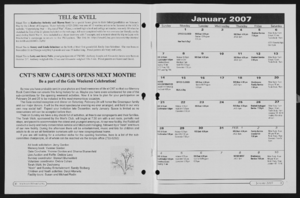Search the Special Collections and Archives Portal
Search Results
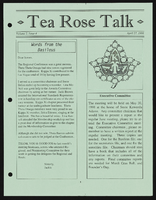
Alpha Kappa Alpha Sorority, Theta Theta Omega Chapter "Tea Rose Talk" newsletter
Date
Archival Collection
Description
From the Alpha Kappa Alpha Sorority, Incorporated, Theta Theta Omega Chapter Records (MS-01014) -- Chapter records file.
Text
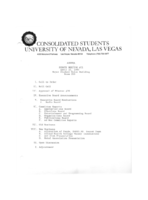
Meeting minutes for Consolidated Student Senate, University of Nevada, Las Vegas, October 14, 1980
Date
Archival Collection
Description
Text
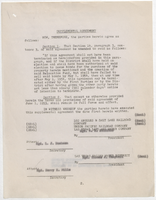
Supplemental agreement (blanks filled in) between Los Angeles & Salt Lake Railroad and partner companies and the Las Vegas Water District, C. L. D. No. 11342-1, 1954
Date
Archival Collection
Description
The purchase contract for the Las Vegas Land and Water Company allows for the contract to be annulled if its bonds are not sold by December 31, 1953. This contract rescinds that deadline, allowing as much time as needed for the sale of the bonds. Agreement that all parties will ignore the provision that any party can terminate the agreement if the bonds do not sell by May 1, 1954.
Text
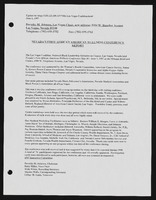
"Nevada's First African American Wellness Conference Report"
Date
Archival Collection
Description
From the Alpha Kappa Alpha Sorority, Incorporated, Theta Theta Omega Chapter Records (MS-01014) -- Chapter records file.
Text
Las Vegas African American Community Conversations round table interviews
Identifier
Abstract
The Las Vegas African American Community Conversations is a four-part conversation with local Las Vegans. The first part of the round table is moderated by Trisha Geran with a central theme of "Migration, Work and Community Emergence." The panelists discuss the early history of the African American community in Las Vegas, Nevada. They also discuss how and why their families moved to Las Vegas, most citing the economic opportunities as a major factor. The participants share their personal histories and family histories building up the African American community in downtown Las Vegas and the Westside. The second part of the round table is moderated by Sonya Horsford with a central theme of "Education, Economy, and Integration." The panelists discuss the Clark County School District pre- and post-integration. They discuss the hardships of the Sixth Grade Center Integration Plan on the African American community as well as discussing the differences in the school facilities. The round table participants also discuss the social services and social programs and the history of those programs from the African American perspective. They also discuss civic involvement and the various civic groups started by the panelists, and share discrimination they faced.
The third part of the round table is moderated by Claytee D. White with a central theme of "Civil Rights and Entertainment." The panelists discuss the racism and segregation present in Las Vegas and discuss how African American community leaders worked to integrate African Americans into the Las Vegas community. They discuss the 1969 riots in detail, and discuss African American entertainers and the entertainment industry. They share personal experiences working in the entertainment industry and discuss the importance of the local unions, such as the Culinary Workers Union Local 226, the International Alliance of Theatrical Stage Employees Local 720, and their contributions to the unions. The fourth and final part of the round table is moderated by Rachel Anderson with a central theme of the "Early African American Legal Community." The panelists discuss the foundations of the professional legal community in Las Vegas, noting the contributions of Charles Keller, Dr. William Bailey, and the Reverend Marion Bennett as driving forces for civil rights activism in Las Vegas. They share their experiences growing up in Las Vegas facing discrimination and segregation. Lastly, they share the changes they have seen and how both the legal and African African communities have grown.
Archival Collection
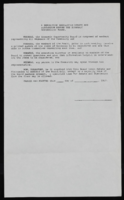
Economic Opportunity Board of Clark County (Nev.): memos, agendas, and meeting minutes
Date
Archival Collection
Description
From the Clark County Economic Opportunity Board Records -- Series I. Administrative. This folder contains memos, agendas and minutes from meetings of the Clark County Economic Opportunity Board from January 1967 through June 1967.
Text

Irma I. Varela interview, March 5, 2019: transcript
Date
Archival Collection
Description
Interviewed by Barbara Tabach. Born and raised in Zacatecas, Mexico, Irma moved to Las Vegas in 1989. She is the Cultural Program Supervisor at Winchester Community Center and has devoted much of her career to preserving Hispanic cultural traditions in Las Vegas. She has been an active leader in local events such as Community Roots, International Food & Folk Life Festival, World Vibrations, and Dio de Los Muertos.
Text

Transcript of interview with Miriam "Mimi" Katz by Barbara Tabach, December 10, 2014
Date
Archival Collection
Description
In this interview, Mimi Katz discusses growing up in the Boston area and her schooling, and moving to Washington, D.C. working as a physiotherapist. She returned to Boston and met her husband, and she talks about moving to Las Vegas and adjusting to life here. They became involved at Temple Beth Sholom, and Mimi worked as a conventions coordinator at the Sands and the Sahara. She discusses moving around in Las Vegas from an apartment to a house in the John S. Park neighborhood, working for the Jewish Federation, and helping to develop the Holocaust education program with Edythe Katz, conducting oral history interviews with survivors. She continued working at the Convention Center in the 1980s, and is involved in the Lou Ruvo Center.
Everyone knows her as Mimi. She was born Miriam Green to immigrant parents in Boston, Massachusetts, in 1926. As a youngster she danced, excelled at school and enjoyed an abundance of sports. To pay for her higher education at Massachusetts School of Physiotherapy she worked at Raytheon Manufacturing. In 1957 she married George Katz who swept her away to their honeymoon in Las Vegas. It's a story that she loves to recall-they never left. She sent for her things and energetically settled in to her new hometown and marriage. Mimi found employment with the Clark County School District, began having children (three daughters), and making fast new friends. Many of these friends were from the founding days of Temple Beth Sholom, which roots her to the history of the local Jewish community. In addition, for a decade she worked in community relations for the Jewish Federation. She valued community activism and volunteered over the years for many organizations; such as Easter Seals, Jewish War Veterans, Parent Teachers Association and the Lou Ruvo Center for Brain Health, and many more organizations over the subsequent decades.
Text


